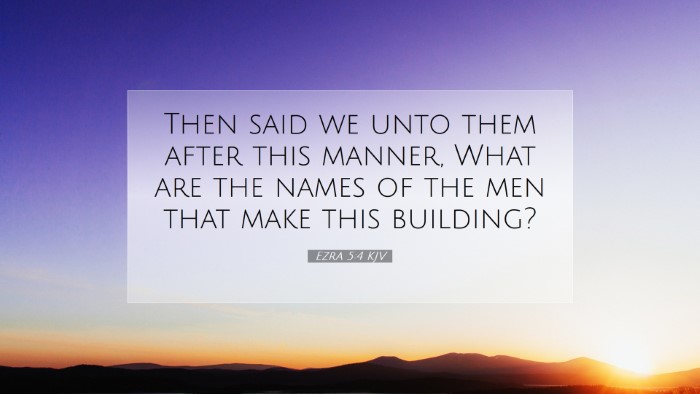Old Testament
Genesis Exodus Leviticus Numbers Deuteronomy Joshua Judges Ruth 1 Samuel 2 Samuel 1 Kings 2 Kings 1 Chronicles 2 Chronicles Ezra Nehemiah Esther Job Psalms Proverbs Ecclesiastes Song of Solomon Isaiah Jeremiah Lamentations Ezekiel Daniel Hosea Joel Amos Obadiah Jonah Micah Nahum Habakkuk Zephaniah Haggai Zechariah MalachiEzra 5:4
Ezra 5:4 KJV
Then said we unto them after this manner, What are the names of the men that make this building?
Ezra 5:4 Bible Commentary
Commentary on Ezra 5:4
In Ezra 5:4, we encounter a significant moment in the rebuilding of the Temple, where the Jewish people face opposition and scrutiny as they endeavor to fulfill God's mandate. This verse, though brief, encapsulates the essence of challenges faced by those who strive to restore spiritual integrity and physical places of worship. Below is a synthesis of insights from various public domain commentaries:
Contextual Background
Before delving into the exegesis of Ezra 5:4, it is important to understand the historical context. The Israelites had returned from Babylonian captivity with the mandate from God to rebuild the Temple in Jerusalem. This endeavor was met with various forms of resistance, both politically and socially, which is amplified in the verses leading up to and following Ezra 5:4.
Historical Significance
Matthew Henry emphasizes that the rebuilding of the Temple is not merely a physical reconstruction; it symbolizes the restoration of worship and the covenant relationship with God. The Israelites had been steeped in the traditions of exile, and their return to Jerusalem marked a significant theological and cultural revival.
Verses and Their Meaning
Ezra 5:4 reads:
“Then we told them the names of the men who were constructing this building.”
This simple statement conveys myriad implications regarding accountability, leadership, and the importance of communal effort in spiritual pursuits. Each of these points can be unpacked further.
Accountability in Leadership
Albert Barnes highlights the importance of transparent leadership in the context of religious activities. The mention of the names of those constructing the building underscores the idea that they were aware of their responsibilities and the significance of their actions in God's plan. The act of naming establishes accountability and a reminder of the communal commitment to God's mission.
Community and Collaboration
In the construction of the Temple, Adam Clarke points out that no single individual bears the weight of this monumental task; instead, it is a joint effort. The unity of the community in named leadership positions reflects the shared responsibility of God's people in spiritual endeavors. Pastors and theologians today can draw parallels to their own communities, emphasizing collaboration in the pursuit of their mission.
Theological Implications
Beyond the historical and social context, the theological implications of Ezra 5:4 resonate profoundly with contemporary readers. This verse signifies the essence of worship being rooted in community and collective action, reflecting God's character and purpose.
The Presence of God in Community
Matthew Henry notes that the act of rebuilding the Temple was not merely about structure; it was about re-establishing the presence of God among His people. The Temple was the dwelling place of God, and its restoration meant revitalization of the spiritual life of Israel. For pastors and students of theology, this signifies the essential nature of worship and how God desires a space among His people for fellowship and communion.
The Role of Opposition
In the surrounding verses, the opposition faced by the Israelites is significant. Opposition serves a dual purpose in the biblical narrative: it can lead to testing and, subsequently, strength in faith. Clarke states that such challenges refine the faithful and fortify their resolve in God’s calling. This is an encouragement for modern believers who may face trials while pursuing God’s work.
Application for Today’s Believers
The truths in Ezra 5:4 are not confined to the historical narrative but resonate with the present realities of communities of faith.
Emphasizing Accountability in Ministry
- Shepherding Leadership: Just as named leaders in the reconstruction of the Temple, today's leaders should be accountable to their congregations and to God.
- Building Together: The work of God's kingdom requires the active participation of all believers. Encouraging congregational involvement in ministry fosters a sense of ownership and shared mission.
Faithfulness Amidst Challenges
- Enduring Trials: Like the Israelites, believers today are called to persist despite adversity, resting in the assurance that God’s presence will guide them.
- Empowerment Through Community: The experience of the early Jewish returnees enforces the idea that they were not alone in their struggles; similarly, churches today must come together in prayer and action.
Conclusion
Ezra 5:4, though seemingly straightforward, invites deep reflection and rich application in both personal and communal faith contexts. The joint commitment to rebuild and restore signifies the heart of communal worship and underscores the biblical principle of accountability among leaders and congregants alike. As current believers navigate their own journeys of faith, the lessons embedded in these words prompt us to engage actively and faithfully, reflecting the glory of God in all our endeavors.


